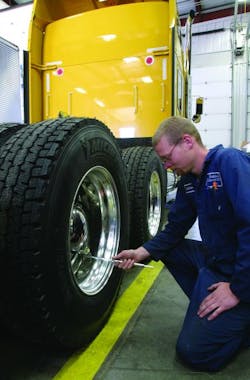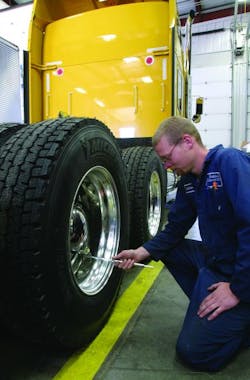Tires: Keep Them Rolling
Sparing your driver the aggravation of an inspection and avoiding CSA violations and fines are not the only reasons you should pay attention to the tires on your trucks. According to the American Transportation Research Institute, tires cost a fleet an average of $0.041 per mile or two percent of a fleet’s marginal cost.
Tires also play a big role in the fuel efficiency of a truck. A recent report from the North American Council for Freight Efficiency on low rolling resistance tires found that rolling resistance accounts for 30 to 30 percent of a vehicle’s total fuel cost. The ATRI report places fuel costs at $0.546 per mile. Do the math and you you’ll see the impact tires have on fuel costs.
Underinflated tires can take a significant bite out of a truck’s fuel efficiency. According to Goodyear’s Radial Truck Tire & Retread Service Manual, “Proper inflation of radial truck tires is the most important maintenance practice to ensure long tire life.” The industry standard is that for ever 10 psi a tire is underinflated there is a corresponding two percent loss in fuel efficiency.
Underflation also causes tread wear, which leads to premature removal of the tire. Tires underinflated by 10 percent can wear five percent faster than a properly inflated tire. Underinflation can also reduce the durability of the tire’s casing and cause tires to wear irregularly.
Goodyear tests showed that 15 percent underinflation on steer, drive and trailer tires lead to an eight percent decrease in tread wear and a 2.5 percent decrease in mpg.
There are many compelling reasons, including safety, for making sure that tires are properly inflated and not worn beyond acceptable tread depth levels.
Once proper tire inflation has been determined, it should be maintained at that level as consistently as possible, according to Goodyear. Your drivers are the first line of defense in tire health. They need to be trained and reminded to perform thorough pre- and post-trip inspections of ALL tires — especially the inside tire on a set of duals — on the tractor and trailer.
Drivers need to check tire pressure using a calibrated gauge, and the gauge needs to be tested periodically to make sure it is working properly. If you’re noticing a lot of CSA violations for underinflated tires you need to retrain drivers or you may want to onsider investing in tire pressure monitoring or inflation systems that automatically alert you when tire pressure is below a specified limit.
Whether or not drivers are inspecting tires during their pre-trip inspections, tire manufacturers recommend that someone at the fleet check tire inflation pressure weekly.
Maintenance checks should also look for things like irregular tire wear, which can be the result of inflation issues, but also could indicate a problem elsewhere in the truck like alignment issues.
Tread depth also needs to be checked regularly. According to Vigillo’s May 2015 Athena Press Pass report, 863,212 CSA violations were issued for tires with tread depth less than 2/32 of an inch.
Employing some basic tire maintenance procedures ensures tires are in good working order and will keep your trucks rolling down the road safely.

